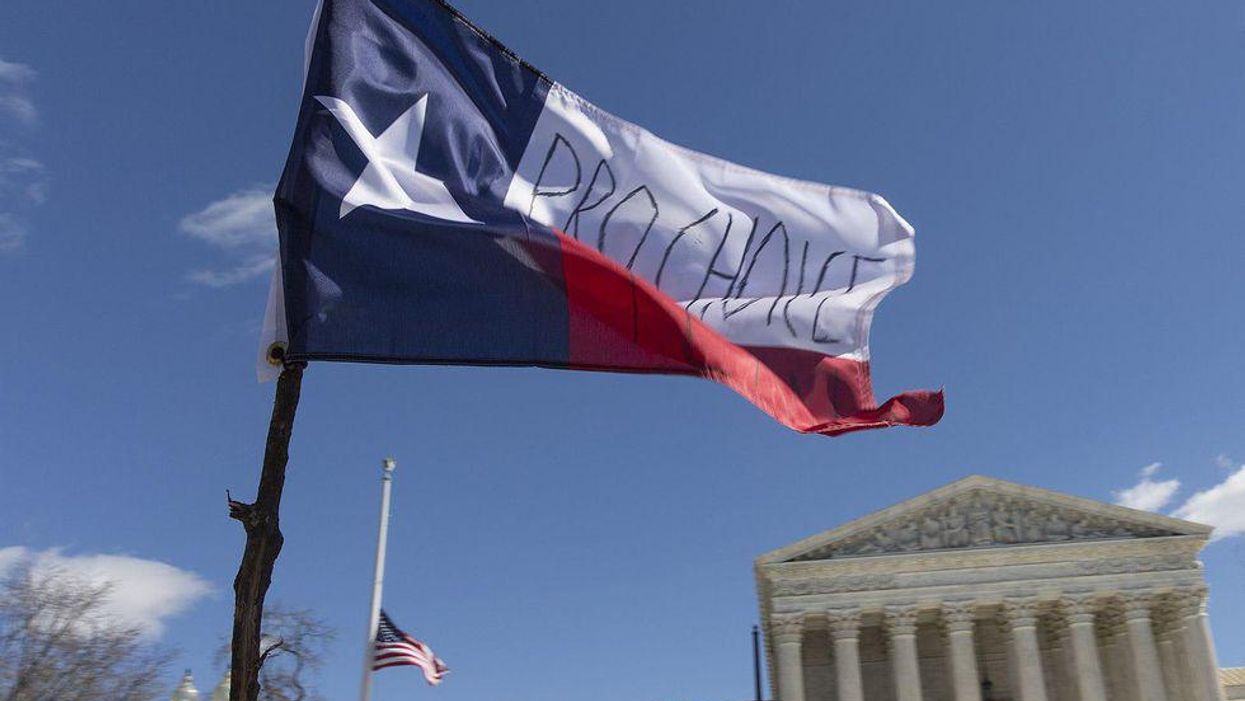The Lone Star State Wasn't Always So Mean, Petty, And Vindictive
Confession: I have always felt warmly toward Texas, and I can't square the big-hearted, boisterous, self-confident place I've known with the petty, mean-spirited, downright vindictive anti-abortion law the state's Republican legislature and governor have endorsed.
Welcome to Beijing on the Brazos. It's as if 29 million Texans had surrendered to fundamentalist authoritarianism, brandishing Bibles like copies of Chairman Mao's Little Red Book, vowing punishment against sinners and informing on their relatives and neighbors.
As I say, this is not the Texas I know: a sprawling, geographically and ethnically complex state larger than France, and which sometimes feels like the nation—as Texans never quit reminding you—that it was from 1836 to 1845.
Parts of Texas resemble Louisiana, others Oklahoma; the Texas panhandle feels a lot like Nebraska, and basically everywhere south of San Antonio like Mexico. The territory around Lubbock somewhat resembles the moon. Unless you really put the hammer down, it's a two-day drive from Beaumont to El Paso or Amarillo.
Texas can be hard to get your mind around. However, having lived there two different times, taught at University of Texas-Austin, and traveled everywhere reporting for Texas Monthly magazine, I've always felt an intoxicating sense of possibility. If I hadn't basically married Arkansas, I'd probably live somewhere near Austin.
To give you some idea, I interviewed a priest in Orange who sponsored two dozen Vietnamese immigrants, covered the great Rockdale football mutiny (undefeated state champs who went on strike against their coach), and hit the road with the Corpus Christi Seagulls, a minor league baseball team. I interviewed migrant workers outside Amarillo, a Nobel Prize-winning physicist at UT-Austin, studied the heavens at the university's observatory in the Davis Mountains, and learned to handle a pistol from an ROTC instructor at Rice University. (Bottom line: don't.) I made pilgrimage to Alvin to interview the great Nolan Ryan.
You don't meet a lot of shy, retiring Texans. Willie Nelson is your classic example, also The Eagles' Don Henley. Buddy Holly, Beyoncé, Waylon Jennings and Stevie Ray Vaughn. Jerry Jeff Walker was raised in upstate New York, but his rendition of Gary P. Nunn's "London Homesick Blues," may be the purest example of slide guitar Texas nationalism extant.
Texas is filled with writers and journalists I admire, from Lawrence Wright and my pal Stephen Harrigan to the late Larry McMurtry. I once drove from Cody, Wyoming to Little Rock listening to Lonesome Dove and was tempted to carry on to Memphis just to finish the story.
Coming to the point, Texas was also home to two of the strongest American women of my own or anybody else's generation: Gov. Ann Richards and the inimitable Molly Ivins, the wittiest American journalist since H.L. Mencken.
Molly once observed of a Dallas congressman that "If his IQ slips any lower we'll have to water him twice a day." She described Bill Clinton as "weaker than bus station chili" -- unfair, in my view, but definitely memorable.
One can only imagine what either woman would have made of Texas' current Gov. Greg Abbott—a poser last seen vowing to protect the state from imaginary invasion during "Operation Jade Helm." Austin's own native hoaxer Alex Jones had persuaded thousands of dupes that networks of secret tunnels were being dug between vacant Walmart stores to help ISIS fighters infiltrate. Christian patriots would be imprisoned in FEMA re-education camps.
Sure enough, the invasion never came. Fresh from that mighty triumph, Abbott has now succeeded in passing an idiotic law empowering every testosterone-challenged goober in Texas to carry a gun anywhere: no lessons or permit necessary. That will cost dozens of lives, but it's the abortion law that's getting all the attention.
Look, there has been a strong undercurrent of authoritarianism in Texas culture since slavery times. But this takes it further: If a 13 year-old child gets impregnated by her uncle, Texas now demands that she bear a child. Otherwise, a vindictive relative or nosy neighbor can collect a $10,000 state bounty for filing a lawsuit against an abortion provider, putting them out of business.
It's like the 1850 Fugitive Slave Act on steroids. Already, a self-described "Christian" group has put up a website, ProLifeWhistleblower.com, inviting people to inform on anybody obtaining or facilitating abortions. The cheapest form of cheap grace imaginable.
Anyway, it's official: Every Texas woman's womb belongs to the state. What's more, thanks to the cunning and cowardice of the US Supreme Court, every state where fundamentalist Bible Beaters hold sway will soon rush to enact it—even if it ultimately means political disaster, which I think it does.
Because Americans just won't stand for turning embittered ex-husbands and vengeful mothers-in-law into bounty hunters. So spare me the theological and biological fundamentalism. Nobody thinks abortion is a good thing; but it's sometimes the least-bad option. Other people's intimate life decisions are nobody else's business, in Texas or anywhere else.










